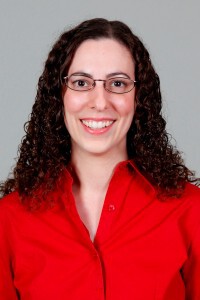AHA members are involved in all fields of history, with wide-ranging specializations, interests, and areas of employment. To recognize our talented and eclectic membership, AHA Today features a regular AHA Member Spotlight series.
Andrea L. Turpin is an assistant professor of history at Baylor  University. She lives in Waco, Texas, and has been a member since 2006.
University. She lives in Waco, Texas, and has been a member since 2006.
Alma mater: PhD, University of Notre Dame, 2011
Fields of interest: US women and gender, US intellectual and religious history, 19th-century and Progressive Era US
When did you first develop an interest in history?
My first semester as an undergraduate at Princeton I took a phenomenal course in the history of the West from Tony Grafton (and my excellent preceptor was Erika Hermanowicz, now a classics professor at the University of Georgia). I enjoyed it so much that when I was looking to switch majors (after deciding astrophysics was not for me!), I chose history.
What projects are you working on currently?
I am currently working on a book manuscript that examines how the entrance of women into US colleges and universities shaped changing ideas about the religious and moral purposes of higher education from the mid-19th century through the Progressive Era. Over this time period college graduates of both sexes played an increasingly large role in directing American society. I’m also working on a new project that examines how members of the Young Women’s Christian Association (YWCA) negotiated a space between the fundamentalist and modernist religious movements of the early twentieth century.
Have your interests changed since graduate school? If so, how?
When I applied to graduate school, I said I wanted to work on the history of gender, religion, and higher education … and I still do! But like many historians, those interests have also led me in new directions. For example, from studying reform movements related to gender, religious, and educational ideals I’ve developed a fascination with utopian experiments. I will be teaching a class on that subject this semester.
Is there an article, book, movie, blog etc. that you could recommend to fellow AHA members?
Blogs I enjoy include the Society for US Intellectual History, Religion in American History, and The Way of Improvement Leads Home (on religious history). I’d also add that students respond well to the HBO movie Iron Jawed Angels about the fight for women’s suffrage. Too many books and articles to name!
What do you value most about the history profession?
I appreciate the opportunity to help students and readers reflect more consciously on our own culture and how it got this way (instead of just walking around blindly in the assumption that “this is just how things are”). My hope is that my students and readers will take away from my teaching and writing a realization of how much the beliefs they choose shape their own lives and the society in which they participate.
Why did you join the AHA?
I joined early on in graduate school as a means of professionalization. I remain a member because I believe it’s important to be aware of what’s going on in the profession as a whole and to contribute to those larger discussions.
Do you have a favorite AHA annual meeting anecdote you would like to share?
In general, I enjoy the annual meeting for the opportunity to attend “state of the field” panels and to catch up with friends over drinks or dinner. I should also add that I was particularly fond of the 2010 meeting in San Diego where it was sunny and 75 for four days in the middle of winter. (This was before I was living in Texas!)
Other than history, what are you passionate about?
Fostering civil dialogue across political viewpoints—without learning to do this better, we will never succeed in making this nation a better place for everyone. Also: dancing, really good chocolate (Vosges, Theo, Chuao), and building community among the singles in my church and city.
This post first appeared on AHA Today.
This work is licensed under a Creative Commons Attribution-NonCommercial-NoDerivatives 4.0 International License. Attribution must provide author name, article title, Perspectives on History, date of publication, and a link to this page. This license applies only to the article, not to text or images used here by permission.